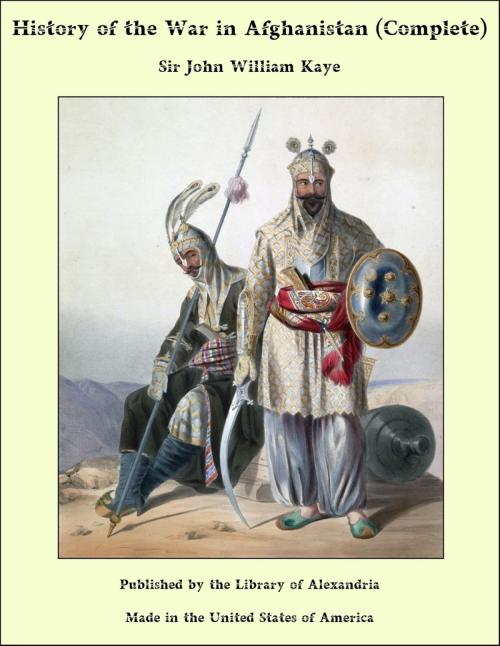History of the War in Afghanistan (Complete)
Nonfiction, Religion & Spirituality, New Age, History, Fiction & Literature| Author: | Sir John William Kaye | ISBN: | 9781465605115 |
| Publisher: | Library of Alexandria | Publication: | March 8, 2015 |
| Imprint: | Language: | English |
| Author: | Sir John William Kaye |
| ISBN: | 9781465605115 |
| Publisher: | Library of Alexandria |
| Publication: | March 8, 2015 |
| Imprint: | |
| Language: | English |
At the dawn of the present century, Zemaun Shah reigned over the Douranee Empire. The son of Timour Shah, and the grandson of the illustrious Ahmed Shah, he had sought, on the death of his father, the dangerous privilege of ruling a divided and tumultuous people. Attaining by intrigue and violence what did not rightfully descend to him by inheritance, he soon began to turn his thoughts towards foreign conquest, and to meditate the invasion of Hindostan. His talents were not equal to his ambition, and his success fell far short of the magnitude of his designs. There was too little security at home to ensure for him prosperity abroad. And so it happened, that he was continually marching an army upon the frontier, eager to extend the Douranee Empire to the banks of the Ganges; and continually retracing his steps in alarm, lest his own sovereignty should be wrested from him in his absence. For many years Zemaun Shah’s descent upon Hindostan kept the British Indian Empire in a chronic state of unrest. But he never advanced further than Lahore, and then was compelled precipitately to retire. Starvation threatened his troops; a brotherly usurper his throne; and he hastened back lest he should find Prince Mahmoud reigning at Caubul in his stead. This was in 1797, when Sir John Shore was Governor-General of India. We smile now at the alarm that was created along the whole line of country from the Attock to the Hooghly, by the rumoured approach of this formidable invader. But half a century ago, the English in India knew little of the resources of the Douranee Empire, of the national characteristics of the people, of the continually unsettled state of their political relations, or of the incompetency of the monarch himself to conduct any great enterprise. Distance and ignorance magnified the danger: but the apprehensions, which were then entertained, were not wholly groundless apprehensions. All the enemies of the British Empire in India had turned their eyes with malicious expectancy upon Caubul. Out of the rocky defiles of that romantic country were to stream the deliverers of Islam from the yoke of the usurping Franks. The blood of the Mahomedan princes of India was at fever heat. From northern Oude and from southern Mysore had gone forth invitations to the Afghan monarch. With large promises of aid, in money and in men, Vizier Ali and Tippoo Sultan had encouraged him to move down upon Hindostan at the head of an army of true believers. Others, with whom he could claim no community of creed, extended to him the hand of fellowship. The Rajah of Jyneghur offered him a lakh of rupees a day as soon as the grand army should enter his district. We, who in these times trustingly contemplate the settled tranquillity of the north-western provinces of India, and remember Zemaun Shah only as the old blind pensioner of Loodhianah, can hardly estimate aright the real importance of the threatened movement, or appreciate the apprehensions which were felt by two governors-general of such different personal characters as Sir John Shore and Lord Wellesley.
At the dawn of the present century, Zemaun Shah reigned over the Douranee Empire. The son of Timour Shah, and the grandson of the illustrious Ahmed Shah, he had sought, on the death of his father, the dangerous privilege of ruling a divided and tumultuous people. Attaining by intrigue and violence what did not rightfully descend to him by inheritance, he soon began to turn his thoughts towards foreign conquest, and to meditate the invasion of Hindostan. His talents were not equal to his ambition, and his success fell far short of the magnitude of his designs. There was too little security at home to ensure for him prosperity abroad. And so it happened, that he was continually marching an army upon the frontier, eager to extend the Douranee Empire to the banks of the Ganges; and continually retracing his steps in alarm, lest his own sovereignty should be wrested from him in his absence. For many years Zemaun Shah’s descent upon Hindostan kept the British Indian Empire in a chronic state of unrest. But he never advanced further than Lahore, and then was compelled precipitately to retire. Starvation threatened his troops; a brotherly usurper his throne; and he hastened back lest he should find Prince Mahmoud reigning at Caubul in his stead. This was in 1797, when Sir John Shore was Governor-General of India. We smile now at the alarm that was created along the whole line of country from the Attock to the Hooghly, by the rumoured approach of this formidable invader. But half a century ago, the English in India knew little of the resources of the Douranee Empire, of the national characteristics of the people, of the continually unsettled state of their political relations, or of the incompetency of the monarch himself to conduct any great enterprise. Distance and ignorance magnified the danger: but the apprehensions, which were then entertained, were not wholly groundless apprehensions. All the enemies of the British Empire in India had turned their eyes with malicious expectancy upon Caubul. Out of the rocky defiles of that romantic country were to stream the deliverers of Islam from the yoke of the usurping Franks. The blood of the Mahomedan princes of India was at fever heat. From northern Oude and from southern Mysore had gone forth invitations to the Afghan monarch. With large promises of aid, in money and in men, Vizier Ali and Tippoo Sultan had encouraged him to move down upon Hindostan at the head of an army of true believers. Others, with whom he could claim no community of creed, extended to him the hand of fellowship. The Rajah of Jyneghur offered him a lakh of rupees a day as soon as the grand army should enter his district. We, who in these times trustingly contemplate the settled tranquillity of the north-western provinces of India, and remember Zemaun Shah only as the old blind pensioner of Loodhianah, can hardly estimate aright the real importance of the threatened movement, or appreciate the apprehensions which were felt by two governors-general of such different personal characters as Sir John Shore and Lord Wellesley.















